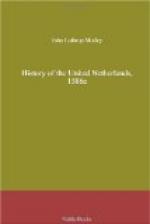It was most important, then, that these two nations should be united in council, and should stand shoulder to shoulder as their great enemy advanced. But this was precisely what had been rendered almost impossible by the course of events during Leicester’s year of administration, and by his sudden but not final retirement at its close. The two great national parties which had gradually been forming, had remained in a fluid state during the presence of the governor-general. During his absence they gradually hardened into the forms which they were destined to retain for centuries. In the history of civil liberty, these incessant contests, these oral and written disquisitions, these sharp concussions of opinion, and the still harder blows, which, unfortunately, were dealt on a few occasions by the combatants upon each other, make the year 1587 a memorable one. The great questions of the origin of government, the balance of dynastic forces, the distribution of powers, were dealt with by the ablest heads, both Dutch and English, that could be employed in the service of the kingdom and republic. It was a war of protocols, arguments, orations, rejoinders, apostilles, and pamphlets; very wholesome for the cause of free institutions and the intellectual progress of mankind. The reader may perhaps be surprised to see with how much vigour and boldness the grave questions which underlie all polity, were handled so many years before the days of Russell and Sidney, of Montesquieu and Locke, Franklin, Jefferson, Rousseau, and Voltaire; and he may be even more astonished to find exceedingly democratic doctrines propounded, if not believed in, by trained statesmen of the Elizabethan school. He will be also apt to wonder that a more fitting time could not be found for such philosophical debate than the epoch at which both the kingdom and the republic were called upon to strain every sinew against the most formidable and aggressive despotism that the world had known since the fall of the Roman Empire.
The great dividing-line between the two parties, that of Leicester and that of Holland, which controlled the action of the States-General, was the question of sovereignty. After the declaration of independence and the repudiation of Philip, to whom did the sovereignty belong? To the people, said the Leicestrians. To the States-General and the States-Provincial, as legitimate representatives of the people, said the Holland party. Without looking for the moment more closely into this question, which we shall soon find ably discussed by the most acute reasoners of the time, it is only important at present to make a preliminary reflection. The Earl of Leicester, of all men is the world, would seem to have been precluded by his own action, and by the action of his Queen, from taking ground against the States. It was the States who, by solemn embassy, had offered the sovereignty to Elizabeth. She had not accepted the offer, but she had deliberated on the subject,




